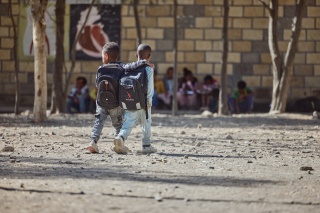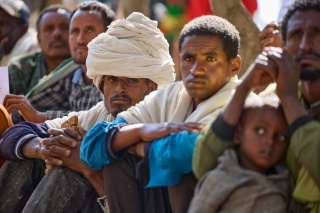
Facts that make grown men cry in the dark - a reflection from Ethiopia
Magnus MacFarlane-Barrow, Founder of Mary's Meals, on the devastating hunger crisis affecting millions of people in Tigray
It is late afternoon by the time we arrive to meet with local representatives in Tigray. The building, now dilapidated, was built in the aftermath of the infamous famine of the mid-eighties. But it is the current hunger crisis that we are here to discuss.
We are ushered through gloomy corridors and find our hosts clustered around the projector they had planned to use for a presentation about the current situation. Apologetically they explain that there is a power cut and so for the next hour we sit through their verbal update instead.
As the room grows darker, layer upon layer of information about the humanitarian catastrophe is conveyed to us. We learn that more than 70% of lactating mothers in Tigray are malnourished; that over half of the children are not attending school; that nearly one million people are still displaced from their homes, several months after the war – which killed approximately 600,000 people – has ended. And around 4.5 million people are now in urgent need of food aid.

We don’t need any convincing of any of these facts, given our last few days have been spent talking to people in various stages of deprivation and hunger. Former business owners reduced to begging to survive. Farmers who have sold their precious oxen to buy food for their children, and who are wondering what they might sell next – all while their dusty fields lay barren, because the drought has made them unreceptive to any kind of seed. And 220 displaced people living in one impossibly crowded former classroom for three years. They too must go out in the streets each day with plastic bags to beg for food. Seven of their number having already died of hunger.
I ask the question that many my age are asking: “Could this be as bad as the famine of the 1980s?” (the one that sparked the Live Aid concert and ultimately took the lives of one million people here).
“You cannot compare the two at all. There are several things that make them very different,” answers one of our hosts patiently, as the lights suddenly flicker back on relieving the deepening gloom.
“This time we are experiencing the third year of drought. The fields are mainly empty. And that is following immediately a catastrophic two-year war, which has taken the lives of 600,000 people, destroyed so much of our infrastructure, decimated economic activity and already left many without the basics they need to begin farming or working again.”
The list continues. Every factor that makes this situation different in fact makes it worse.
“And, of course, last time the world was aware of our plight and responded in a massive way.”
“So, it could be worse?” I hesitated to ask the question.
“Well, that depends on whether the world does indeed respond this time.”

The men around the table by now look unbearably tired. Before our meeting they had been overseeing food deliveries to villages and trying to deal with outpourings of anger and desperation. We are also weary, having come directly from a village where we spent time with a mother who has found herself having to beg each day for her children’s needs. She spoke about how kind people were to her but explained that now many who used to give her food for her children are now reduced to begging themselves.
Our local co-worker, a nun who already knew these public servants, begins to thank them for the help they had given her and her fellow sisters during the war. I think she does so in an attempt to encourage them but – as she speaks of those desperate days of acute hunger – she suddenly breaks down, sobbing uncontrollably as the dam containing her grief bursts.
The rest of us, all being men, awkwardly begin trying to say something to comfort her, but none of us seem able to speak. And then the lights go out again and the darkness spares us at least some embarrassment as we all sit and cry together.

